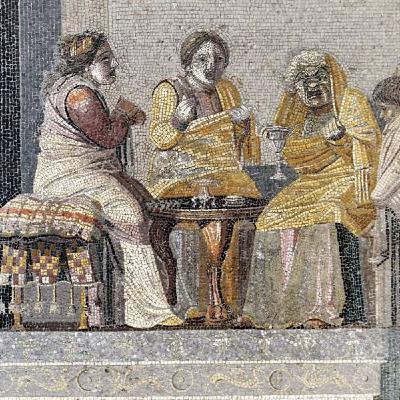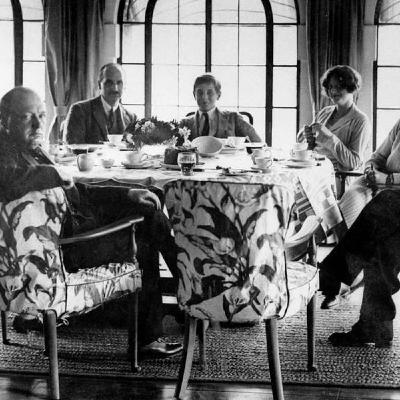3. #LONDINIUM90AD LIVE AT 6 PM ET SUNDAY: 8/31: GAIUS & GERMANICUS DEBATE: Women with Money, Billionaire Politicians, and the New Roman Republic.
Update: 2025-09-01
Description
3. #LONDINIUM90AD LIVE AT 6 PM ET SUNDAY: 8/31: GAIUS & GERMANICUS DEBATE: Women with Money, Billionaire Politicians, and the New Roman Republic.
This segment explores the historical and contemporary intertwining of money, power, and politics, comparing wealthy individuals in ancient Rome with those in 21st-century America. Gaius introduces Claudia of Matelis, a powerful Roman woman from the 1st century BCE who, despite formal restrictions like needing an advisor and being barred from court, inherited immense wealth and lived an independent life, exercising "great political power". Gaius observes that "politics and money in Rome were the same thing," a truth he believes also applies to America.
Germanicus elaborates that in traditional societies, women historically played powerful, behind-the-scenes political roles, often linked to class and wealth, citing figures such as Livia in Rome or Madame de Pompadour. In the modern U.S., he notes a significant "galloping ahead" of women's wealth and influence, projecting that women will control 75% of discretionary spending by 2028, and already hold over 66% of consumer wealth and 51% of all stocks. The discussion then shifts to the emergence of billionaire politicians. While historical figures like JP Morgan, Carnegie, and John D. Rockefeller possessed immense wealth, they were not directly engaged in politics. Today, however, there is a rise of billionaires, including women such as Steve Jobs' wife (who owns The Atlantic and engages in "charitable or political charitable giving"), directly influencing politics. This trend, they suggest, could lead to "family dynasties," exemplified by the Pritzker family.
The speakers connect this phenomenon to Roman history, particularly after Constantine's conversion to Christianity, where "unbelievably rich senators" and their widows became crucial political players and funders of networks like monasteries and churches. They mention a period in the 5th-century Western Empire where three senators each held more wealth than the imperial state itself. They further link the increasing disproportion of wealth and income in the United States to levels comparable to pre-French Revolution France. In Rome, such inequality led to the "revolution" that ended the Republic and ushered in "billionaire politicians" like Crassus, Caesar (who gained massive wealth despite being in debt), and Augustus (whose wealth "soared" with power). The segment concludes with the assertion that America is becoming "more and more like Rome every single day" and is heading towards a future potentially dominated by "billionaire presidents," with Mr. Trump making claims in this vein. Germanicus predicts that these billionaires will become the "new dukes and counts" of American politics, potentially creating a political system characterized by a struggle between the emperor/state and these extraordinarily powerful figures.
79 AD WOMEN OF ROME
#LONDINIUM90AD LIVE AT 6 PM ET EVERY SUNDAY: GAIUS & GERMANICUS DEBATE. FRIENDS OF HISTORY DEBATING SOCIETY. @MICHALIS_VLAHOS. PRODUCED BY CHRIS NOEL.
This segment explores the historical and contemporary intertwining of money, power, and politics, comparing wealthy individuals in ancient Rome with those in 21st-century America. Gaius introduces Claudia of Matelis, a powerful Roman woman from the 1st century BCE who, despite formal restrictions like needing an advisor and being barred from court, inherited immense wealth and lived an independent life, exercising "great political power". Gaius observes that "politics and money in Rome were the same thing," a truth he believes also applies to America.
Germanicus elaborates that in traditional societies, women historically played powerful, behind-the-scenes political roles, often linked to class and wealth, citing figures such as Livia in Rome or Madame de Pompadour. In the modern U.S., he notes a significant "galloping ahead" of women's wealth and influence, projecting that women will control 75% of discretionary spending by 2028, and already hold over 66% of consumer wealth and 51% of all stocks. The discussion then shifts to the emergence of billionaire politicians. While historical figures like JP Morgan, Carnegie, and John D. Rockefeller possessed immense wealth, they were not directly engaged in politics. Today, however, there is a rise of billionaires, including women such as Steve Jobs' wife (who owns The Atlantic and engages in "charitable or political charitable giving"), directly influencing politics. This trend, they suggest, could lead to "family dynasties," exemplified by the Pritzker family.
The speakers connect this phenomenon to Roman history, particularly after Constantine's conversion to Christianity, where "unbelievably rich senators" and their widows became crucial political players and funders of networks like monasteries and churches. They mention a period in the 5th-century Western Empire where three senators each held more wealth than the imperial state itself. They further link the increasing disproportion of wealth and income in the United States to levels comparable to pre-French Revolution France. In Rome, such inequality led to the "revolution" that ended the Republic and ushered in "billionaire politicians" like Crassus, Caesar (who gained massive wealth despite being in debt), and Augustus (whose wealth "soared" with power). The segment concludes with the assertion that America is becoming "more and more like Rome every single day" and is heading towards a future potentially dominated by "billionaire presidents," with Mr. Trump making claims in this vein. Germanicus predicts that these billionaires will become the "new dukes and counts" of American politics, potentially creating a political system characterized by a struggle between the emperor/state and these extraordinarily powerful figures.
79 AD WOMEN OF ROME
#LONDINIUM90AD LIVE AT 6 PM ET EVERY SUNDAY: GAIUS & GERMANICUS DEBATE. FRIENDS OF HISTORY DEBATING SOCIETY. @MICHALIS_VLAHOS. PRODUCED BY CHRIS NOEL.
Comments
In Channel
























